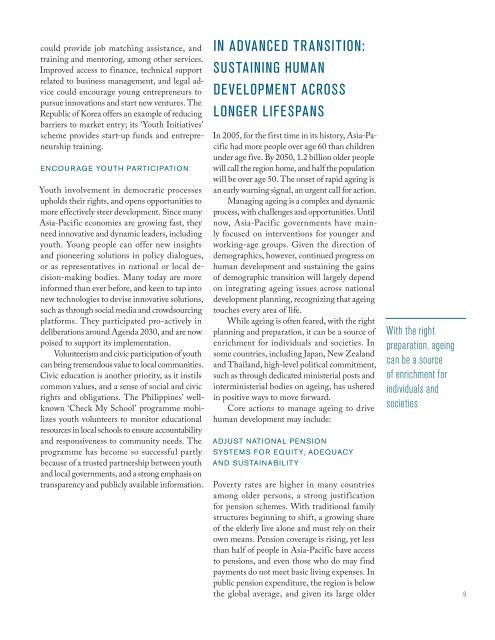SHAPING THE FUTURE HOW CHANGING DEMOGRAPHICS CAN POWER HUMAN DEVELOPMENT
1VPo4Vw
1VPo4Vw
Create successful ePaper yourself
Turn your PDF publications into a flip-book with our unique Google optimized e-Paper software.
could provide job matching assistance, and<br />
training and mentoring, among other services.<br />
Improved access to finance, technical support<br />
related to business management, and legal advice<br />
could encourage young entrepreneurs to<br />
pursue innovations and start new ventures. The<br />
Republic of Korea offers an example of reducing<br />
barriers to market entry; its ‘Youth Initiatives’<br />
scheme provides start-up funds and entrepreneurship<br />
training.<br />
ENCOURAGE YOUTH PARTICIPATION<br />
Youth involvement in democratic processes<br />
upholds their rights, and opens opportunities to<br />
more effectively steer development. Since many<br />
Asia-Pacific economies are growing fast, they<br />
need innovative and dynamic leaders, including<br />
youth. Young people can offer new insights<br />
and pioneering solutions in policy dialogues,<br />
or as representatives in national or local decision-making<br />
bodies. Many today are more<br />
informed than ever before, and keen to tap into<br />
new technologies to devise innovative solutions,<br />
such as through social media and crowdsourcing<br />
platforms. They participated pro-actively in<br />
deliberations around Agenda 2030, and are now<br />
poised to support its implementation.<br />
Volunteerism and civic participation of youth<br />
can bring tremendous value to local communities.<br />
Civic education is another priority, as it instils<br />
common values, and a sense of social and civic<br />
rights and obligations. The Philippines’ wellknown<br />
‘Check My School’ programme mobilizes<br />
youth volunteers to monitor educational<br />
resources in local schools to ensure accountability<br />
and responsiveness to community needs. The<br />
programme has become so successful partly<br />
because of a trusted partnership between youth<br />
and local governments, and a strong emphasis on<br />
transparency and publicly available information.<br />
IN ADVANCED TRANSITION:<br />
SUSTAINING <strong>HUMAN</strong><br />
<strong>DEVELOPMENT</strong> ACROSS<br />
LONGER LIFESPANS<br />
In 2005, for the first time in its history, Asia-Pacific<br />
had more people over age 60 than children<br />
under age five. By 2050, 1.2 billion older people<br />
will call the region home, and half the population<br />
will be over age 50. The onset of rapid ageing is<br />
an early warning signal, an urgent call for action.<br />
Managing ageing is a complex and dynamic<br />
process, with challenges and opportunities. Until<br />
now, Asia-Pacific governments have mainly<br />
focused on interventions for younger and<br />
working-age groups. Given the direction of<br />
demographics, however, continued progress on<br />
human development and sustaining the gains<br />
of demographic transition will largely depend<br />
on integrating ageing issues across national<br />
development planning, recognizing that ageing<br />
touches every area of life.<br />
While ageing is often feared, with the right<br />
planning and preparation, it can be a source of<br />
enrichment for individuals and societies. In<br />
some countries, including Japan, New Zealand<br />
and Thailand, high-level political commitment,<br />
such as through dedicated ministerial posts and<br />
interministerial bodies on ageing, has ushered<br />
in positive ways to move forward.<br />
Core actions to manage ageing to drive<br />
human development may include:<br />
ADJUST NATIONAL PENSION<br />
SYSTEMS FOR EQUITY, ADEQUACY<br />
AND SUSTAINABILITY<br />
Poverty rates are higher in many countries<br />
among older persons, a strong justification<br />
for pension schemes. With traditional family<br />
structures beginning to shift, a growing share<br />
of the elderly live alone and must rely on their<br />
own means. Pension coverage is rising, yet less<br />
than half of people in Asia-Pacific have access<br />
to pensions, and even those who do may find<br />
payments do not meet basic living expenses. In<br />
public pension expenditure, the region is below<br />
the global average, and given its large older<br />
With the right<br />
preparation, ageing<br />
can be a source<br />
of enrichment for<br />
individuals and<br />
societies<br />
9


